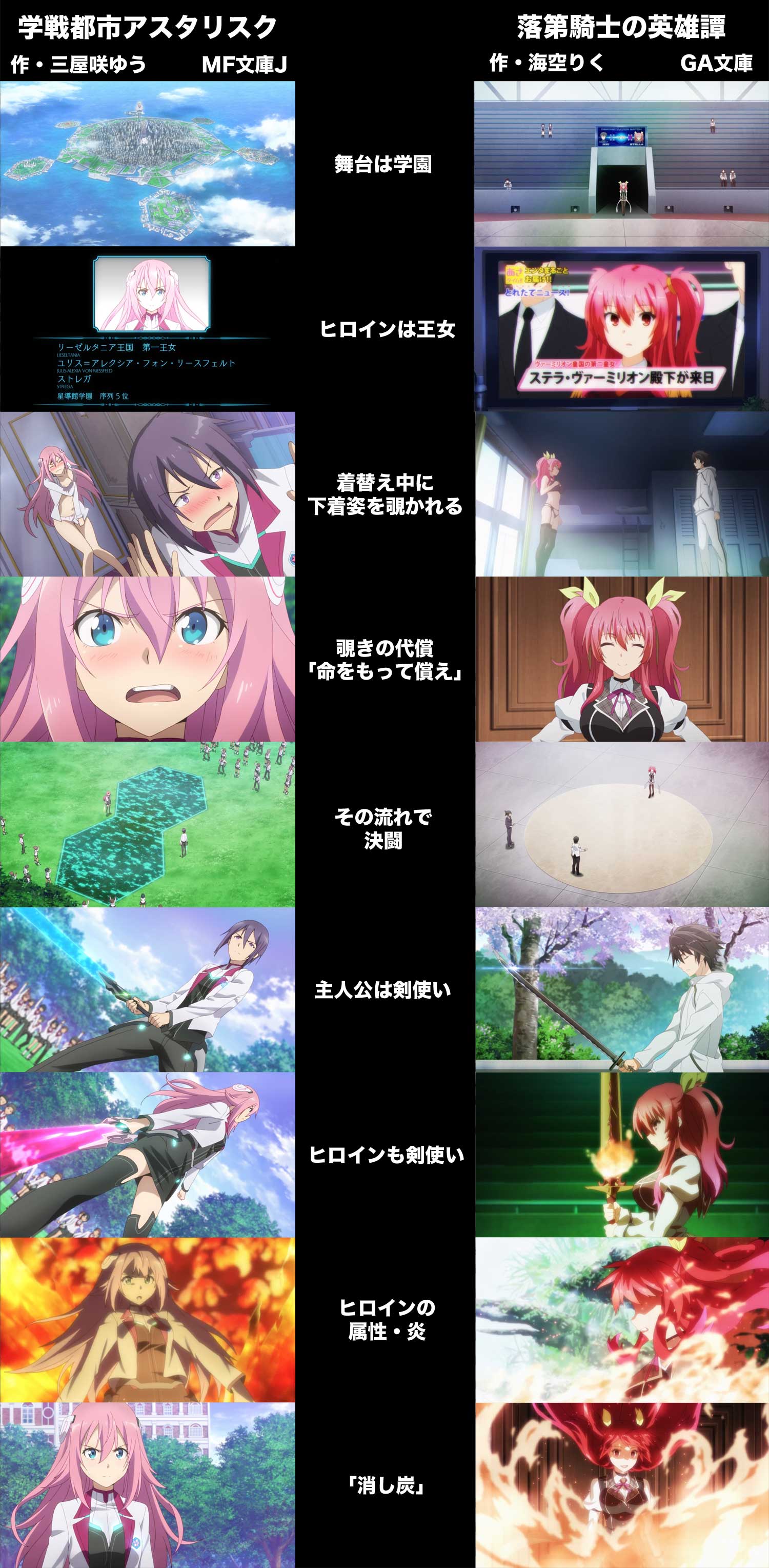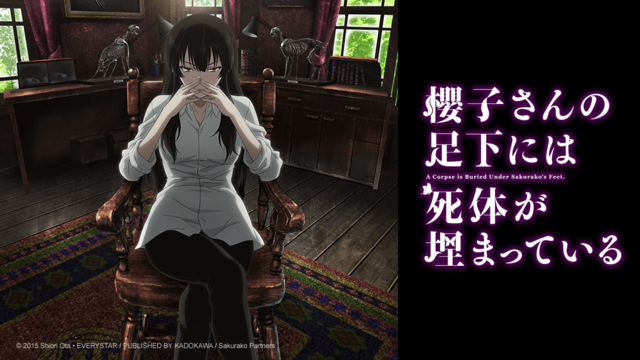
I'll do this in descending order from my favorite to least favorite.
Who's ready for another essay-length post on Gakkou Gurashi? Anybody? Too bad! There are plenty of ways to consider this anime: taking it at face value as a story about girls trying to survive a terrible situation, a portrayal of the grieving process, etc. Right now, I'd like to address the show as a commentary on the slice-of-life genre. Over the last few weeks, I've heard some people voice disappointment that Gakkou Gurashi did not live up to the promise of its first episode. Rather than being a deep analysis of slice-of-life anime, critics charge, it became a psychological-horror/drama series with a slice-of-life gimmick. While I can respect this opinion, I think the people voicing it underestimate how clever a criticism of slice-of-life Gakkou Gurashi became. Firstly, once the cat was out of the bag at the end of episode one, there was no way to get it back in. Essentially, Gakkou Gurashi did the same thing as Madoka Magica, just much earlier in the series. If episode two had been the same as episode one with a few more hints of reality, and episode three had yet more, it would have gotten old fast. It was a wise decision to spend a few episodes focussing on how bad the situation really was. Yes, it broke one of the rules of genre by introducing an ongoing story arc, complete a goal, but it is a mistake to assume all slice-of-life elements were overwhelmed by horror and drama. A huge chunk of Gakkou Gurashi was dedicated to slice-of-life antics and it's important to recognize just how often the grim and gritty stuff was shoved aside because Yuki suddenly said, "Break time! We're doing something fun now! Yes, all of us!" This led to one of the show's most interesting tactics: the ongoing war between two genres, both wanting screen time. It became a study in contrast between the lighthearted and the disturbing.
So, what does it all mean? I'm convinced the sudden tone shifts weren't just to keep the audience interested (which it does fantastically well). Consider this: over the last few years, a strain of the slice-of-life genre has developed, dedicated to moe. This has lead to plenty of arguments over the genre's future. Slice-of-life, shout the naysayers, has forsaken its traditional focus on relatability and unique characterization in favor of stale character archetypes and mindless cuteness. Too much escapism, not enough depth. Gakkou Gurashi, as I interpret it, is partly a commentary on this state of affairs. Its conclusion is ambivalent, which I love. The show is like, "You want an easy to understand moral? Fuck you. Here's two contradictory morals. Resolve the issue yourself, bitch." All the slice-of-life, cutesy, fun stuff in the series is a result of a traumatized teenager's delusions, which casts the genre's focus on moe as nothing but escapism. Kind of reminds me Paranoia Agent, actually. Things get complicated when the positivity Yuki's delusions bring her is portrayed as a valid coping mechanism which helps ensure the whole group's continued survival. So maybe escapism isn't such a bad thing after all. I'd say Gakkou Gurashi eventually comes down on the side of moderation, as evident when Yuki abandons her delusions, but remains the group's source of optimism. A little escapism is healthy, it says. Just don't forget to devise solutions to life's problems.
Does Gakkou Gurashi count as deconstruction? Honestly, I kind of don't care. That label is ever-changing and carries too much baggage for me to respect. I do think that Gakkou Gurashi is kin to the Madokas and Evangelions of the world. They have the same objective: subvert audience expectations and provoke thought on a genre. For that matter, their methods are more alike than different. Gakkou Gurashi contained all the necessary ingredients to make a moe slice-of-life anime (character archetypes, cute girls in a high school club, cheery visuals, super-deformed segments, a character with no presence, subtle fan service, character quirks and in-jokes, a sports festival/beach/graduation episode) and turns them in unexpected, often disturbing directions. So yes, it is the show's intention that we think carefully about the genre.
In summary: Gakkou Gurashi is a clever, brilliantly staged and emotionally moving anime, complete with clever genre-related commentary. The last half of the last episode seemed to be setting up for a continuation, which I'd certainly like to see and the show's successful ratings make fairly likely. Admittedly, I'm not sure if Gakkou Gurashi would be as good without Yuki's delusions, but I'm cautiously optimistic such expert storytellers could come up with something good.
This anime successfully made me care about people engaged in something for which I normally feel, at best, ambivalence. Japanese pop idols interest me not, but Sore ga Seiyuu humanized them so effectively that I couldn't help but root for them. In particular, Ichigo surprised me. When first introduced, she seemed little more than a comic relief parody of idols, but over time, she developed into a deeply driven professional with an impressive work ethic. The cuteness was great, but appropriately, didn't supersede the emotion and storytelling as the focus. Also, I thought it was fun how the ending sequence was set up as a radio show with no dialogue and lyrics each time. The requests in particular were a nice way to switch things up each time. I know Sore ga Seiyuu didn't do particularly well in the ratings, so it's unlikely to get a second season, but I'd like to see some sort of continuation. Maybe an OVA or two.
Initially, Umaru was pretty easy to dislike. She was selfish, bratty, and abusive towards her sad-sack of a brother. Over time, however, she started to show some seriously redeeming qualities. One of my favorite things about Himouto! was how it plays with different personas and how we present various parts of our personalities to different people. It gets a little complicated remembering who thinks Umaru is who, but that's part of the comedy and reflects life surprisingly well. My favorite parts of the show were when Umaru was not wearing the hamster hoodie. School Umaru is partially a fake created to keep up appearances, but I think this persona has more than a little sincerity to it. If Umaru indulges in her most selfish urges while at home, she indulges in the more kindly and selfless part of her personality when she is at school. It's not a total fake is what I'm getting at. To me, the most interesting persona was UMR, the alias she takes while hanging out with Sylphynford at the arcade. Despite the mask, UMR is Umaru at her most honest, a merging of the layabout chibi and perfect schoolgirl personas. She plays games and competes for dominance, but is also nice to her friend. At first, I thought Sylphynford was just an annoying rival character, but she developed into a clever foil for Umaru, allowing the protagonist to show both competitiveness and kindness. Similarly, it was funny but slightly annoying to watch Umaru take advantage of her brother, but it was genuinely touching how often she showed him genuine affection and vice-versa. The love between them was believable. One of the most memorable scenes in Himouto! was the one which implied the big brother doted on Umaru because she reminds him of his mother. I'd like some more of that. It would be surprising if Himouto! Umaru-Chan doesn't get a second season and I will watch if it does.
I feel a little guilty for liking this anime. It's crude and over-sexualized and I normally dislike this kind of thing. Yet, I watched the whole season and had fun. Prison School's strongest source of humor was the faux-seriousness it applied to completely ridiculous scenarios. Two of the best examples that come to mind are how Gakuto shitting his pants in class was treated as a noble sacrifice and Kiyoshi agonizing over how to prove himself as an ass man. As silly as it all was, the prolonged seriousness made the characters being freed genuinely refreshing. Like Gakkou Gurashi (man, that's quite a strange comparison), the final scene of Prison School seemed to be setting up a second season and I was surprised how everything worked out. The prisoners are free, but the title would still make sense. Part of me is genuinely curious to see where it's heading. Will Prison School get a second season? It's a decent possibility. Will I watch? Sigh. Probably.
I'm going to lie down now.




